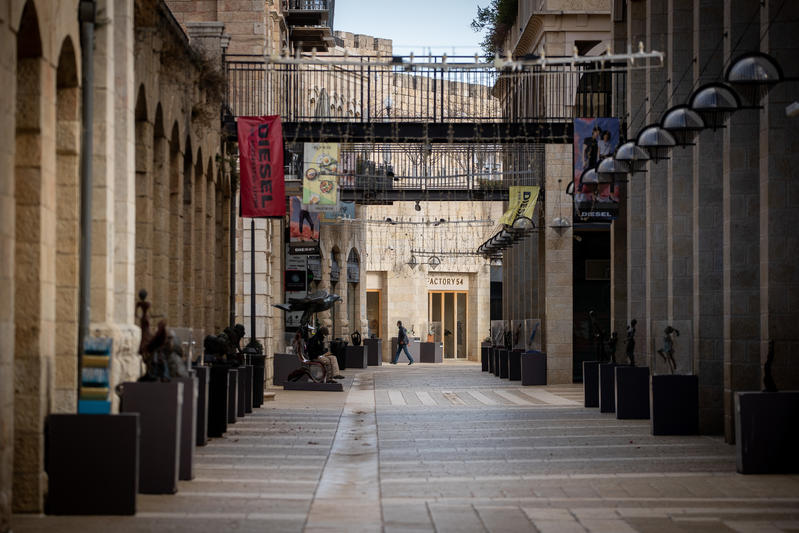Missiles, Blackouts, and Ghost Towns: How Daily Life in Israel Has Changed
Israel has entered full emergency mode since last week’s escalation with Iran, with the Home Front Command enforcing strict measures across civilian life. Public gatherings are banned, schools and most workplaces shut, major events canceled. Only essential services operate under tight restrictions. The comparison is stark; daylight offers a deceptive calm, nights are filled with fear and urgency. The routine of life collides dramatically with wartime alertness.

On June 13, 2025, Israel launched Operation “With the Lion’s Might,” targeting Iran’s nuclear and military infrastructure, prompting retaliatory missile attacks that have profoundly disrupted daily life across the nation. The Home Front Command’s Level 4 emergency regulations, enacted to protect civilians from Iran’s ballistic missile barrages, have transformed routines, with workplace closures, limited public transport, and constant night-time anxiety reshaping the Israeli experience. As the conflict escalates, sparked by Iran’s push to create nuclear weapons, Israelis face unprecedented challenges while demonstrating remarkable resilience.
Workplace Closures and Economic Impact
The Home Front Command’s directives, urging citizens to stay near shelters and avoid non-essential travel, have led to widespread workplace closures. Offices, retail stores, and factories, particularly in central and northern Israel, have either shut down or shifted to remote work where possible. Schools and universities have suspended in-person classes, with online learning becoming the norm. The economic toll is significant, with small businesses struggling amid reduced foot traffic. “The streets are empty; it’s like a ghost town,” said David Cohen, a Jerusalem shopkeeper, highlighting the eerie quiet in urban centers. The closure of non-essential businesses has compounded financial strain, especially in cities like Tel Aviv and Haifa, hit hardest by missile threats.
Public Transport Disruptions
Public transportation has been severely curtailed, with buses and trains operating on minimal schedules or halting entirely in high-risk areas. The Home Front Command’s guidelines prioritize safety, advising against unnecessary travel, resulting in nearly deserted roads. “I haven’t seen a bus in days,” noted Sarah Levy, a Haifa resident, reflecting the challenges of commuting. Train services to northern cities like Nahariya have been suspended, and intercity bus routes are limited to essential travel. This disruption has stranded workers and isolated communities, with many relying on private vehicles or carpooling under strict safety protocols. The closure of Israel’s airspace, stranding 200,000 citizens abroad, and the maritime evacuation plan via Cyprus underscore the crisis’s severity.
Nighttime Anxiety and Disrupted Sleep
The constant threat of Iranian missile attacks, with over 200 launched since October 2024, has turned nights into periods of intense distress. Sirens blare frequently, forcing families into safe rooms or bomb shelters, disrupting sleep and causing widespread anxiety. “We’re exhausted, waiting for the next siren,” shared Miriam Katz, a Tel Aviv mother of two. The Home Front Command’s instructions to remain near shelters at all times have led to sleepless nights, with mental health services reporting a 40% increase in anxiety-related consultations since the conflict escalated. The psychological toll is evident, as families grapple with the uncertainty of when the next attack might come.
Closure of Social and Entertainment Spaces
Restaurants, cafes, theaters, and concert halls across Israel have shuttered, adhering to the ban on public gatherings. Iconic venues in Jerusalem, Tel Aviv, and Haifa stand empty, depriving communities of social outlets crucial for morale. “It’s heartbreaking to see our community spaces dark,” said Yossi Ben, a restaurant owner in Jerusalem. High-profile events, such as Avner Netanyahu’s wedding scheduled for June 16, were canceled due to security restrictions, reflecting the broader impact on social life across all sectors. The closure of entertainment spaces has also hit the cultural sector hard, with artists and performers turning to virtual platforms to maintain connections.
Community Resilience and Coping Mechanisms
Despite the disruptions, Israelis are showing remarkable resilience. Communities have rallied through online support groups, sharing resources and encouragement. “We’re finding ways to stay connected, even if we can’t meet in person,” said Mia Rosen, a young professional from Haifa. Volunteer networks are distributing essentials to those in need, and social media platforms like X have become vital for real-time updates and solidarity. Despite the ongoing threat of attacks, the Home Front Command’s guidelines, have been widely followed, reflecting a collective commitment to safety.
As Israel navigates this turbulent period, the hope for a swift resolution remains strong. The Home Front Command continues to update its guidelines, urging citizens to stay informed via official channels. The resilience of Israelis, forged through decades of conflict, shines through as communities adapt to this new reality, balancing fear with determination to protect their homeland.